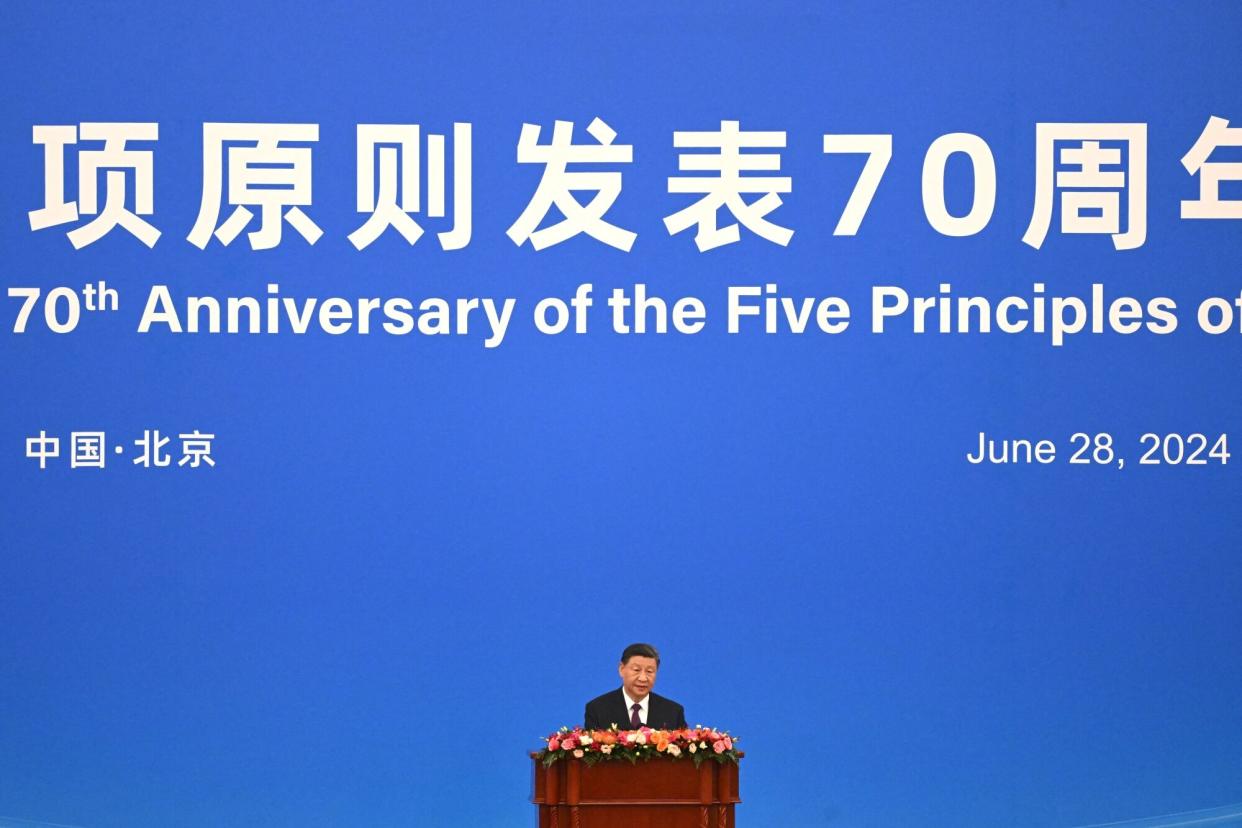Xi Calls for Global South to Play Bigger Role on World Stage

(Bloomberg) -- Chinese leader Xi Jinping called for the Global South to have a greater say in international affairs, stepping up his efforts to challenge US influence around the world.
Most Read from Bloomberg
Democrats Question Replacing Biden: Here’s How It Could Work
Supreme Court Overturns Chevron Rule in Blow to Agency Power
Developing nations should “be at the forefront of promoting the building of a community with a shared future for mankind,” Xi said in a speech Friday in Beijing.
The countries “need to work together to be a stabilizing force for peace” and contribute to resolving conflicts around the world, he said, according to a transcript of the remarks posted online by the government. In a veiled swipe at the US, Xi said the world “should never be allowed to listen to whoever has a strong arm.”
The comments underscore Xi’s campaign over his roughly 12 years in power to revamp the global governance system to free it from what his diplomats frequently refer to as “US hegemony.” A key aspect of that drive has been forging a stronger friendship with Russia and expanding BRICS.
BRICS, which is named after members Brazil, Russia, India, China and South Africa, doubled in size this year by luring Global South nations. It offers access to financing and also provides a political venue independent of Washington’s influence.
Membership to the grouping is also a way for nations to signal increasing frustration with the US-led order and key institutions that remain firmly in the control of Western powers, like the World Bank and International Monetary Fund.
China has spearheaded a push to expand the bloc in recent years. Malaysian Prime Minister Anwar Ibrahim recently declared his intention to apply for membership to the bloc, and Thailand, a US treaty ally, has announced its own bid.
China’s push to lead that challenge coincides with it taking a more aggressive approach in its diplomacy and territorial claims, especially regarding Taiwan and the Philippines, which are both backed by the US.
Beijing is engaged in escalating tensions with the Philippines over a disputed shoal in the South China Sea. A clash on June 17 saw China’s coast guard wielding axes and a Philippine sailor lose his thumb in a confrontation that underscored Beijing’s willingness to see how far it can push Manila and its allies in Washington.
Xi’s government has also offered diplomatic and economic support to Russia since its full-scale invasion of Ukraine in 2022, much to the frustration of the US and European Union. Moscow’s trade with China hit a record $240 billion in 2023, propelled by Russian oil and gas sales, and purchases of electronics, industrial equipment and cars.
Xi’s speech Friday came at an event to mark 70th anniversary of China formulating its “Five Principles of Peaceful Coexistence,” which Beijing holds up as a cornerstone of its foreign policy.
In his remarks, Xi said his nation was willing to discuss free-trade arrangements with Global South countries. He also pledged to open a Global South Research Center, and offer more educational opportunities to people in developing nations.
He signaled that he understood working with the US was necessary, saying that efforts “to seek decoupling run against the trend of history, and will only harm the common interests of the international community.”
Those comments come after the US said it was considering more limits on China’s access to high-end semiconductors.
Xi also urged all nations to align with China in standing against interference in others’ internal affairs, and to “oppose forcing other countries to choose sides.”
(Updates with more details of Xi’s speech and context.)
Most Read from Bloomberg Businessweek
Japan’s Tiny Kei-Trucks Have a Cult Following in the US, and Some States Are Pushing Back
The FBI’s Star Cooperator May Have Been Running New Scams All Along
RTO Mandates Are Killing the Euphoric Work-Life Balance Some Moms Found
How Glossier Turned a Viral Moment for ‘You’ Perfume Into a Lasting Business
©2024 Bloomberg L.P.

 Yahoo News
Yahoo News 

